What crew competence and training help future-proof the superyacht industry?
As the superyacht industry approaches a significant transition phase, with new technologies driving digitalization and the uptake of zero-carbon fuels, yacht management companies share their thoughts on upcoming crew competencies and training needs.
The superyacht industry is on a trajectory of growth amidst the development of trends in decarbonization and digitalization, running parallel with an increasing prioritization of sustainability, safety and the well-being of its guests. All of this requires motivated and well-skilled crews at a time when scarcity and crew training needs in the maritime industry, especially within the yacht sector, are on the rise.

DNV-led study sees huge training demand for seafarers
One area where competence development is needed relates to the new energy solutions and alternative fuels introduced to the industry. A study titled “Insights into Seafarer Training and Skills Needed to Support a Decarbonized Shipping Industry”, prepared by DNV with input from the Maritime Just Transition Task Force and its Global Peer Industry Learning Group, examined the number of seafarers requiring additional training in connection with the introduction of alternative fuels, provided an overview of skills needed for the decarbonization of shipping, and addressed the challenges that training will entail.

Global competition for skilled seafarers increases
Three scenarios were studied, with the “Zero Carbon by 2050” scenario estimating that a vast number of seafarers will require special training – nearly two million working aboard ships equipped with alternative fuel technologies. It is predicted that there will be global competition for people skilled in dealing with alternative technologies, and experienced and certified seafarers will be scarce. This mirrors what we can expect in the superyacht industry as well.
As crew shortages increase, many companies are intensifying their focus on retaining their current workforce by encouraging long-term careers for crew members, advocating advanced technical training, and acknowledging the importance of mental health.

Yacht industry experts discuss crew challenges and training needs
We interviewed James Allen, Director of Yacht Management at Arrow; Shelley Dowie, Head of Yacht Operations at Edmiston; Paul Cook, COO of Hill Robinson; Laura Henighen, Head of Academy at Hill Robinson; and Celine Robins, Global Yacht Management Director at IYC. They shared their experiences and thoughts on current and future crew and safety challenges, discussing the skills and training they believe will be necessary to future-proof the yacht industry.

Upgrading career perspectives to retain crew
James Allen, Director of Yacht Management at Arrow, highlights a pressing challenge concerning sufficient crew numbers for both the present and future global fleet. “Solely for Arrow’s newbuild yacht projects there is an immediate need for up to 500 crew members in the coming three to four years,” he points out. “It becomes more important to recruit committed individuals, not solely driven by short-term gains or wanderlust, but dedicated to a long-term career within the industry.”

Addressing skill gaps
Shelley Dowie, Edmiston’s Head of Yacht Operations, sees the biggest crew competency challenges they face as a company in skill gaps and flexibility. “The industry today is a very different place to what it was 20 years ago; it is heavily regulated, the average yacht size has more than doubled, and we have a new generation of yacht owners, which is reshaping the industry and creating skill shortages in the crew. The training and certification process needs to adapt to keep up with these changes.”

Crew competences for the energy transition
“As regulation changes in the industry, we will need to find solutions to future-proof for the life of the yacht and importantly ensure the infrastructure is built to support new technology and low/zero-carbon fuels,” Dowie says.
Allen sees an upcoming need for more customized training and training adapted to technology, citing an example of a complex refit transitioning from a traditional drivetrain to a hybrid system with batteries undergoing sea trials. The transition involves a sophisticated power management system where the chief engineer, accustomed to simpler diesel engines and generators, now faces the challenge of learning the new application and troubleshooting it remotely for when the manufacturer is not on board. “Can he go on a training course?” Allen questions. “It is difficult as training would be quite specific to the system that has been installed. It is their software, management system, control system that he needs to learn to interface with. Remote assistance can help – if it is available 24/7.”

Increasing demand for engineering training in evolving fuel technology
Hill Robinson’s COO, Paul Cook, noted: “There is a shared vision of developing crew competencies, but it encounters major time and organizational constraints. Complicating matters is the abundance of information and ever-changing technologies – changes that are happening faster than training can be organized.”
“As the use of zero-carbon fuels increases, there will be a greater need for training, particularly for engineers, to which the industry must respond,” he adds. “This area itself is rapidly evolving, and research is heading in many directions, such as alternative fuels, energy storage solutions, new propulsion systems and related equipment. This also means that crew training must adapt to ensure these developments can be operated, since a technology that is used today may not be used 10 years from now.”

Mental health training to become mandatory
Arrow anticipates a growing demand for engineers well-versed in electricity and high voltage, emphasizing the value of proactive crew seeking to enhance their knowledge in these areas. Michaela Svecova of Arrow also underscores the significance of mental health training for crew, particularly in isolated yacht settings. “It should become mandatory for heads of departments to have mental health training and know how to deal with situations – so they can spot different behaviour and prevent issues.”

Digitalization and connectivity need focus on cyber security
There has been a huge shift in the requirement for continuous connectivity and streaming, through integrated entertainment systems as well as smart control and monitoring systems throughout the yacht industry. Satellite technology has advanced recently to meet these demands. “With an increased digital infrastructure, we need to be mindful of the risk such new software and technology has on cyber security,” Downie says.
Laura Henighen, Head of Academy at Hill Robinson, sees that today’s crew have a higher level of digital intelligence than previous generations. “Technology has been an integral part of their lives since birth and therefore they can adapt faster to new technologies on board,” she says. The yachting industry is one of the pioneers when it comes to adopting innovative technologies.

Constant training to ensure safety in the digital age
“Yacht owners can be an influential part of this, as many of them have been in the technology industry themselves, with the rapid change from VSAT to Starlink within the last 2–3 years being a prominent example,” says Henighen. “But, in a world where everyone is facing increasing physical and cyber risks, understanding exposure and ways to improve security measures are essential to protecting assets, people and reputation. It is the double-edged sword of the cocktail caused by technological advances and a higher comfort level felt by technology-immersed young crew. It again comes back to the perennial requirement for constant training and education to ensure at all levels our crew and yachts are operated in a safe and positive manner.”

Modernizing yacht maintenance: The imperative of planned maintenance software
Celine Robins, Global Yacht Management Director at IYC, highlights the industry’s struggle to adapt to new technologies. Robins points out the intricate maintenance demands of a 60-metre yacht, encompassing approximately 200 pieces of equipment, each requiring specific maintenance at intervals like 25, 100, 6,000 and 10,000 hours. Multiply these schedules by 200 and it becomes clear that planned maintenance software (PMS) is essential.
Robins says: “With typically one to four engineers on board, some believe they can rely on memory for maintenance needs. However, implementing a PMS on a vessel frequently reveals a substantial backlog of overdue maintenance. Many yacht engineers still rely on paper logs for maintenance records, which presents a barrier to accepting and using software solutions.”

Overcoming crew resistance to new technologies
“Addressing these challenges involves overcoming crew resistance to technology, adopting and promoting comprehensive safety education, as well as encouraging the transition to digital processes for tasks,” says Robins.
“Crew training is required in technology and should be featured more prominently in crew training curricula. Like how students attend university course with their laptops, crew members should have these technologies integrated into their fundamental training.”

Advanced career opportunities with the right skills
All in all, yacht managers see enormous potential for career-minded crew entering the superyacht arena to excel, particularly those that seize opportunities to advance their knowledge on both the technical side – becoming experts on fuel and project management as yachts are retrofitted – and people skills, not forgetting mental health issues in the highly connected environment crew will be living in aboard yachts.

DNV training courses for yacht crew members
“DNV supports the knowledge development in the yacht industry in various ways,” says Jon Rysst, Senior Vice President & Business Development Leader at DNV. The Maritime Academy, for example, offers customized training courses for yacht crew members and consistently develops new programmes to address future demands, notably in digitalization and decarbonization, with a strong focus on cyber security as well. Additionally, regular free webinars provide insights into recent developments in these fields.
The annual report “Maritime Forecast to 2050” takes an in-depth look at the maritime industry’s decarbonization journey and provides updates on fuel and technology adoption and other opportunities to achieve zero-carbon emissions in shipping.
Contact us

- Shutterstock / Lucia.Pinto
- daviles - stock.adobe.com
- Shutterstock / Wirestock Creators
View image copyright information
